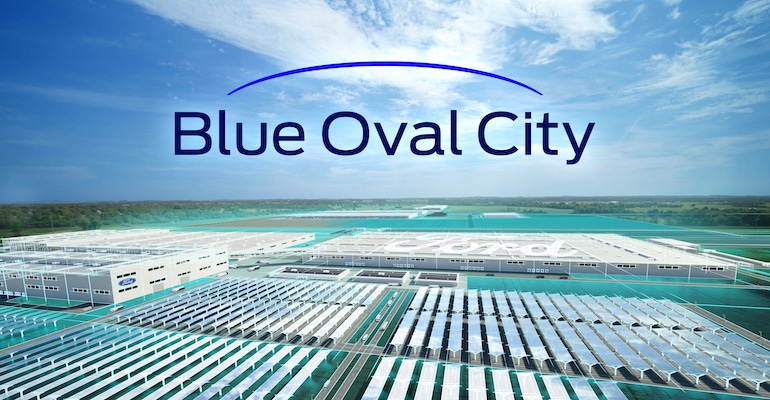Ford Boosting EVs: New Mega Campus in Tennessee and Two New Battery Plants in Kentucky
Ford’s new Blue Oval City mega manufacturing campus will bring its electric vehicles to scale.
September 28, 2021

Ford Motor Company is creating an all-new electric vehicle (EV) manufacturing ecosystem by reimagining how electric vehicles – and the batteries that power them – are designed, manufactured, and recycled.
The company announced that its Blue Oval City mega campus in Tennessee and twin battery plants in Kentucky will create 11,000 jobs and power a new lineup of advanced future EVs.
Ford says the 3,600-acre campus will cover nearly 6 square miles and will include vehicle assembly, battery production, and a supplier park in a vertically integrated combination that provides cost efficiency while minimizing the overall carbon footprint of the manufacturing process. The mega campus is designed with the potential to use local renewable energy sources such as geothermal, solar, and wind power.
According to a Ford news release, the highlights of the plan include:
Ford will bring electric zero-emission vehicles at scale to American customers with the largest, most advanced, most efficient auto production complex in its 118-year history
Called Blue Oval City, the complex will be constructed on a nearly 6-square-mile site in west Tennessee and build next-generation electric F-Series pickups and advanced batteries
A new BlueOvalSK Battery Park is to be built in central Kentucky consisting of twin battery plants that will power a new lineup of Ford and Lincoln EVs
Ford and SK Innovation plan to invest $11.4 billion and create nearly 11,000 new jobs – close to 6,000 in Stanton, Tennessee, and 5,000 in Glendale, Kentucky; production of the new electric vehicles and advanced lithium-ion batteries will begin in 2025
The three new BlueOvalSK battery plants – two in Kentucky and one in Tennessee – will enable 129-gigawatt hours a year of U.S. production capacity for Ford
With an on-site wastewater treatment plant, the assembly plant aspires to make zero freshwater withdrawals for assembly processes by incorporating water reuse and recycling systems
Zero-waste-to-landfill processes will capture materials and production scrap at an on-site materials collection center to sort and route materials for recycling or processing either at the plant or at off-site facilities once the plant is operational
Ford will work with Redwood Materials on closed-loop domestic battery recycling and make a new investment to increase production of the F-150 Lightning pickup in Dearborn, Michigan, starting next year
Ford is investing $90 million in Texas – $525 million total in the U.S. to train skilled technicians to service-connected, electric zero-emission vehicles
Ford’s investment of $7 billion is part of Ford’s more-than-$30 billion investment in electric vehicles through 2025 to supports the goal to create a sustainable American manufacturing ecosystem, and to accelerate progress towards achieving carbon neutrality targets in line with the Paris Climate Agreement. Ford expects 40% to 50% of its global vehicle volume to be fully electric by 2030.
Transformation
“This is a transformative moment where Ford will lead America’s transition to electric vehicles and usher in a new era of clean, carbon-neutral manufacturing,” said Ford Executive Chair Bill Ford. “With this investment and a spirit of innovation, we can achieve goals once thought mutually exclusive – protect our planet, build great electric vehicles Americans will love and contribute to our nation’s prosperity.”
Ford’s present EV lineup includes the F-150 Lightning pickup truck, the E-Transit van, and the Mustang Mach-E SUV. “This is our moment – our biggest investment ever – to help build a better future for America,” said Jim Farley, Ford president, and CEO. “We are moving now to deliver breakthrough electric vehicles for the many rather than the few. It’s about creating good jobs that support American families, an ultra-efficient, carbon-neutral manufacturing system, and a growing business that delivers value for communities, dealers, and shareholders.”
Kevin Clemens is a Senior Editor with Battery Technology.
About the Author(s)
You May Also Like





